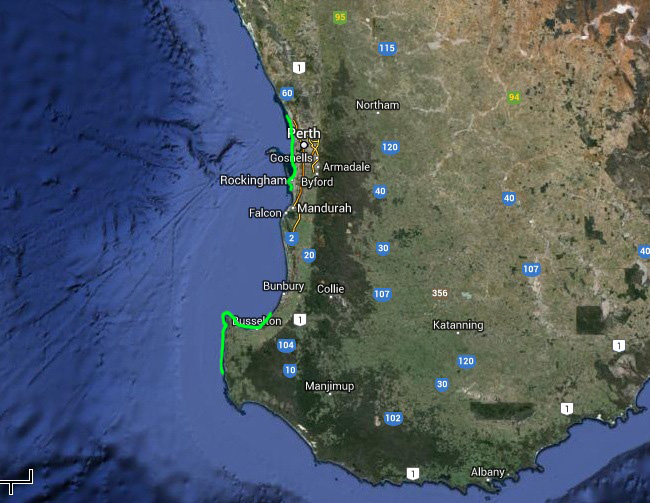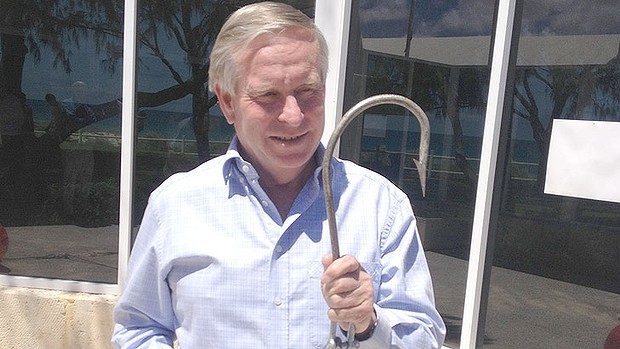Everything You Need To Know About The W.A. Shark Cull
Western Australia's State Parliament is due back on February 18, and Premiere Colin Barnett's shark cull is sure to dominate proceedings. Here's where we're at with it.

In November this year, surfer Chris Boyd was taken by a great white shark in Gracetown, Western Australia. As well as being a tragic event for his family and friends, it was the third fatal shark attack in the country’s south-west corner in the last decade, and the sixth fatal attack in WA in the last two years. The WA Department of Fisheries launched an unsuccessful hunt for the shark that killed Boyd, and in early December, the WA government advertised for private operators willing to handle the “management, release of by-catch, retention or disposal of the targeted catch and 12 hour patrols of drum line areas”. This was the first hint that the WA government was planning a cull, and by the end of December, the whole thing was out in the public domain — possibly a little ahead of schedule.
Premier Colin Barnett, aka ‘Cullin’ Barnett’, dismissed suggestions that the cull was a short-sighted and politically opportunistic move, and the cull commenced on January 10 despite a nationwide backlash. As of January 21, though, the successful tenderer had pulled out, citing safety threats (from humans), and the Fisheries Department has taken on maintenance of the lines and the ‘safe disposal’ of the sharks.
State Parliament is due back on February 18. Given the rather embarrassing comments from experts in shark-attack hotspot Hawaii last week (spoiler alert: culling doesn’t work), and the fact that the House hasn’t sat since early December before all this cull business erupted, the issue is sure to dominate proceedings.
How does this culling even work?
Basically, a “shark cull” involves floating drums anchored a kilometre offshore. Stretched out between the drums are ropes, and attached to the ropes are baited hooks.
When something gets snagged on a hook, it sends a signal to the Maritime Justice Squad (okay: contracted commercial fishermen) with jurisdiction over the affected stretch.

If it’s a great white shark, a bull shark or a tiger shark over three metres in length, it will be towed out to sea and destroyed, i.e. shot with a gun. If it’s anything else, it will be released, and we just hope it learns its lesson and stays away from the delicious chum next time.
Wait, didn’t we all agree that this was a terrible idea back in January?
Yes. There were protests large and small throughout January and February – Cottesloe Beach hosted two protests numbering around four thousand and six thousand people, respectively. And that was just when we thought it was a bad idea on ethical and ecological grounds.
Ethically, because we’re talking about an endangered species in its natural habitat (Federal Minister for the Environment Greg Hunt has granted the WA government an exemption from the federal law that protects endangered species, so that the cull can be carried out. The Greens are challenging the exemption in the Senate), and because of the inevitable collateral damage, with juvenile sharks and other species already having been caught in significant numbers (according to The Guardian, over a dozen juveniles had been snared as of February 7, along with a single full-grown shark). Boyd’s family have made no comment on the proposed cull, but the mother of Kyle Burden, who was taken by a shark at Bunker Bay in 2011, has voiced her vociferous opposition to the scheme.
Also, this:
Ecologically, it’s just never a good idea to mess with the top of the food chain at the best of times, let alone with an endangered species with a low reproductive rate and a very wide migratory range. But don’t take my word for it, ask Michael Heithaus, who has been studying the effects of sharks on the ecosystem in Shark Bay, Western Australia.
Now, we knew all that, but we also knew that the counter-argument – don’t care, human life is more valuable – had a certain rough-hewn merit as well.
But things just got more interesting. Two days ago, News Corp’s Perth Now thought to ask Hawaii what they thought about the plan.
Maui, Hawaii is the only place in the world to have implemented a systematic culling policy. In the period from 1959–76, approximately 4,500 sharks were killed, with no discernible reduction in the incidence of shark attacks. Since the discontinuation of the culling program, state’s Department of Land and Natural Resources has diverted funds into researching the causes of attacks, and possible preventative measures.
These research efforts have isolated two root causes: firstly, overfishing has depleted sharks’ food supplies, driving them closer to shore in search of a meal; and secondly, there are simply more people swimming in the ocean than ever before. In terms of preventative measures, the Fisheries Ecology Research Lab at the University of Hawaii are strong advocates of using shark-repellent acoustic technology. “Given the ineffectiveness of culling in Hawaii and the dramatic global decline in shark populations, it seems unwise to me to cull sharks just to make people feel better,” said Dr Alan Friedlander, who said WA’s policy was “unwise” and “a knee-jerk reaction”. “The presence of sharks around WA is a sign of a healthy ecosystem,” he continued. “People and sharks are both parts of the ecosystem and we need to understand their behaviour so that we can coexist with them well into the future.”
In Barnett’s defence, Fisheries Minister Ken Baston has re-iterated the state government’s commitment to further research (and their Twitter warning program really is ingenious), but one wonders why Cullin’ Barnett didn’t make a few calls to his Hawaiian buddies first.
Are you saying that the cull is ethically indefensible, environmentally irresponsible and a completely ineffective way of dealing with the supposed problem?
Technically it’s a shark attack prevention scheme, not a cull. But yes: that’s exactly what I’m saying.
So why is Colin Barnett so impressively devoted to this bad idea?
I’d love to say ‘perhaps he knows something that we don’t’, but really, this one looks like it’s straight out of the fear-mongering playbook. You know the drill: Don’t look at me and my legislative record! No, ignore my inaction on human policy matters! The enemy is out there on the ocean, encroaching on our sovereign borders, threatening our way of life! We must stand united!
It’s a popular diversionary tactic among politicians trying to either a) swerve a scandal, b) boost flagging approval ratings, or c) compensate for a lack of meaningful policy. For Barnett, it’s option b). In attempting to curb rampant public spending (which has cost WA its AAA credit rating from Standard & Poor’s), Barnett has backed away from the Perth Airport rail link that was promised ahead of the 2013 election. As if reneging on a key election promise wasn’t enough, he has also incurred heavy criticism from his attempts to reign in spending by cancelling the state’s solar buyback scheme and attempting to charge skilled migrants $4000 to send their children to public schools. Whattaguy.
So what exactly should we be doing then?
I completely understand the primal terror that sharks arouse when one swims in the ocean, but I think it makes more sense to address the tangible threat that sharks pose, rather than the abstract fear that they inspire. I’d love to see an expansion of the current Twitter warning system, which sees tagged sharks triggering an automated, localised warning when they approach the shore.
Fisheries advise: tagged Tiger shark detected at Garden Island (north end) receiver at 07:58:00 AM on 9-Feb-2014
— Surf Life Saving WA (@SLSWA) February 9, 2014
Additionally, the olfactory and acoustic shark-repellent currently being developed sounds pretty impressive.
None of these options are flawless, though. The most important thing is that we accept the risk that we take when we step into the ocean, along with our complicity as humans in heightening that risk.
Don’t ask me, though; ask someone who has devoted their professional life to researching the issue. You listening, Colin?
–
Edward Sharp-Paul is a writer from Melbourne. He mostly likes talking about music, politics and the sportz, and his words can be found at FasterLouder,Mess+Noise, Beat and The Brag. He runs his mouth off under the cunning alias @e_sharppaul.

